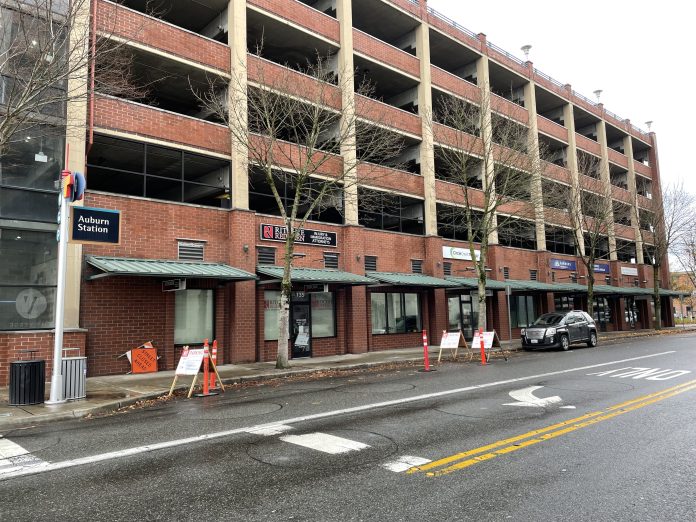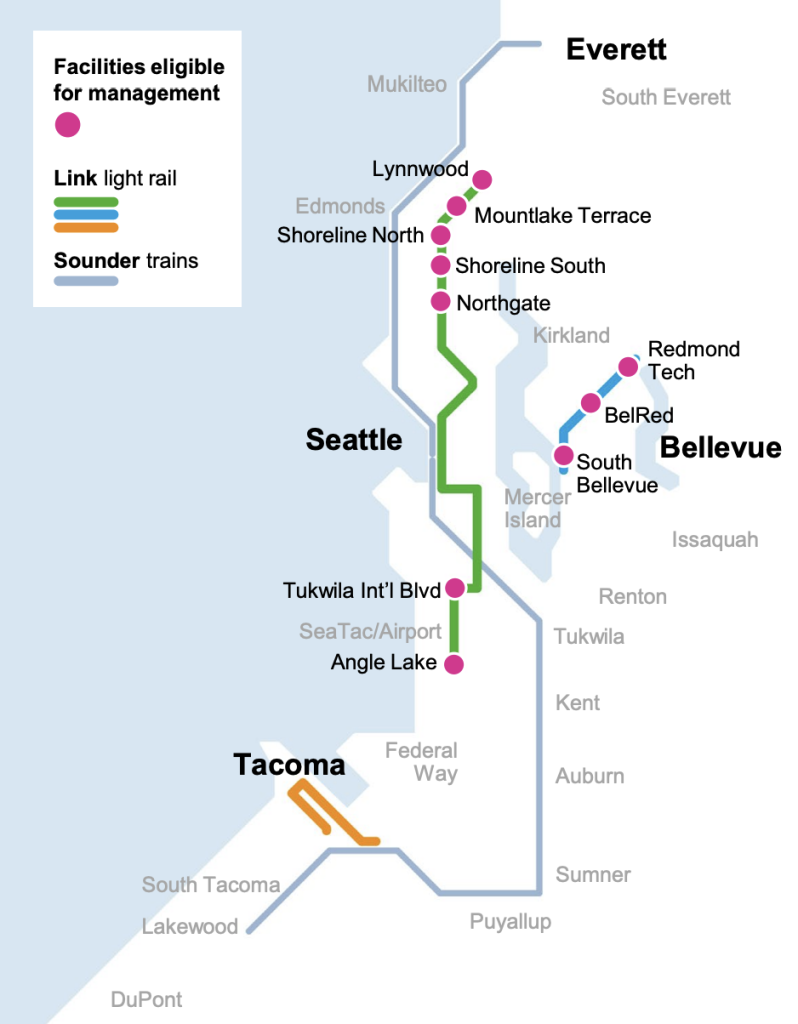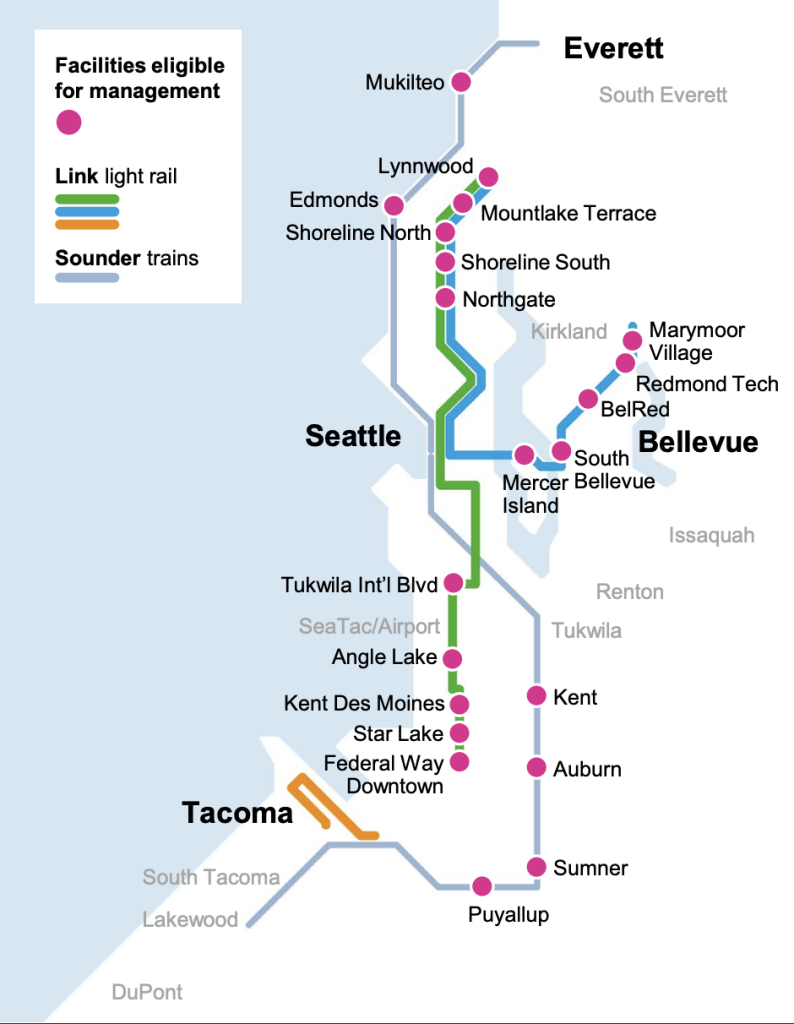Paid parking is set to reach many Sound Transit facilities later this year after the agency’s governing board approved a major policy change last Thursday, enabling daily paid parking fees. Agency staff unveiled the proposal in February after conducting public engagement on program changes.
The new parking management policy will authorize the Sound Transit CEO to make changes at busier parking facilities. During the initial implementation phase, up to 10 Sound Transit-owned parking facilities — including at all Link stations that include parking — could see daily paid parking begin around the time that the Lynnwood Link Extension opens. Agency planners expect that the number of facilities with daily paid parking could rise to 21 by 2026 when the program is projected to be fully implemented.
Under revised policy, daily paid parking fees can be set at any parking facilities with direct access to Link, when average peak weekday parking utilization reaches at least 70% for three consecutive months, or where new facilities are projected to reach 70% parking utilization within one year of opening. The Sound Transit CEO will have flexibility to adjust and set fees at eligible facilities based upon local considerations, but initially will only charge $2.00 per day on weekdays. Up to 100% of parking stalls could become paid parking at eligible facilities.
In February, Sound Transit staff said that daily fees wouldn’t be collected on Fridays or weekends but would apply Monday through Thursday to drivers parking before 2:00pm. The agency is now saying that the details haven’t been finalized, so whether the paid periods will be extended or shortened or includes Fridays remains to be seen.
Additionally, the agency is more or less retaining its monthly permit parking program for carpools and single-occupant vehicles (SOVs). Under revised policy, permit parking would be allowed at any parking facilities with direct access to Link, when average peak weekday parking utilization reaches at least 90% for three consecutive months, or where new facilities are projected to reach 90% parking utilization within one year of opening. The CEO will be able to designate up to 25% of parking spaces as permit parking at eligible facilities during peak hours. Previously, the CEO could designate up to 50% of parking spaces as permit parking at eligible facilities.
Currently only four facilities — Northgate, Tukwila International Boulevard, Angle Lake, and Sumner stations — have monthly permit parking. The agency expects that new Link stations and a change in behavior could increase the number of eligible facilities in the future. At participating facilities, monthly permit parking holders will continue to be able to receive free permits if registering as bona fide carpools. SOV permits are not currently available, but if and when they become available those permit holders will have to pay a monthly fee — low-income riders will be able to get those permits at a deeply reduced price.
Sound Transit planners told the agency governing board that the agency will test a mix of paid parking and permit parking where eligible under the revised policy.
A change that came later in the policy revision process is special event fees. Agency planners had originally suggested that it was a counterproductive policy choice, but between February and March something changed.
Under the revised policy, the CEO will able to impose special event paid parking during peak and off-peak periods at any parking facilities expected to see high demand as a result of major regional events. That includes events like stadium concerts, major sporting events, street festivals, or parades. Fees imposed will only be the maximum daily rate in effect at the parking facility and all vehicles parked before the special event period with a valid permit or daily parking fee will be honored with no additional charges if parked during the special event period.
Sound Transit plans to launch a mobile and web app, provided by its parking management vendor, Passport Labs, Inc., in time for implementation of the daily paid parking program. Riders will be able to use the app as a primary means to pay fees and monitor parking availability. Passport Labs will also provide options for riders to pay in cash or with credit and debit cards at kiosks.
To validate that riders have paid, Passport Labs will monitor parking facilities using automated license plate verification technology. Drivers paying and holding a permit will have their vehicle license plate pre-registered, allowing for the verification. Parking at facilities will be limited to 24 hours, so any riders staying over 24 hours from a pay period without having made another payment will be recognized as a violator and penalized accordingly.
In time, Sound Transit plans to integrate parking with ORCA transit cards, allowing riders to make payments directly from their ORCA accounts. That’s dependent upon the new ORCA system completing Phase 1 implementation — already two years in the making.
Sound Transit estimates that new paid parking program will raise $5 million to $7 million in net revenue per year, above and beyond program administration costs, by full implementation in 2026. Through 2046, the agency projects $46.7 million in net revenue, making it a notable revenue funding source for the agency with proceeds being directed to the agency’s System Access Fund for pedestrian and bike improvements. The estimates, however, don’t factor in special event fees, which weren’t modeled, so that could add millions more in potential revenue through 2046. Regardless, revenue will be well short of the huge cost of providing parking at rapid transit stations in the first place.
Riders can expect the revised program to start being phased in later this summer and fall.
Stephen is a professional urban planner in Puget Sound with a passion for sustainable, livable, and diverse cities. He is especially interested in how policies, regulations, and programs can promote positive outcomes for communities. With stints in great cities like Bellingham and Cork, Stephen currently lives in Seattle. He primarily covers land use and transportation issues and has been with The Urbanist since 2014.




